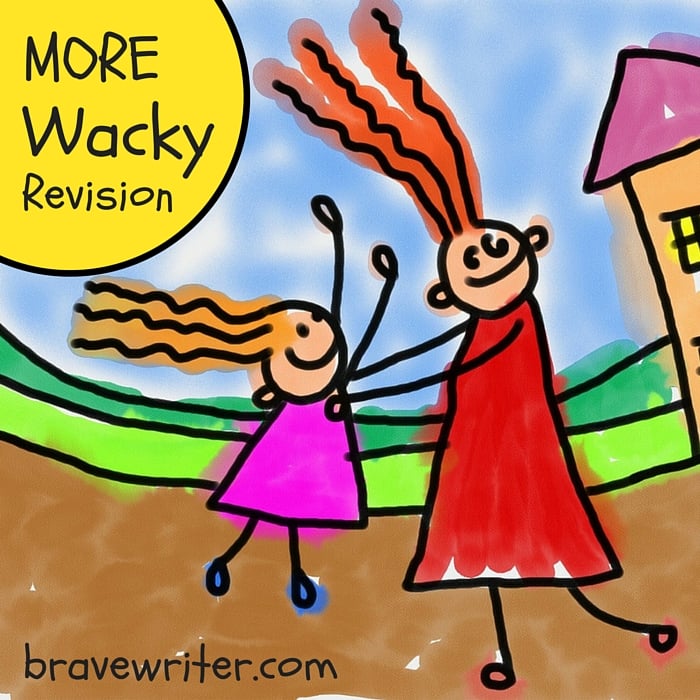Facilitating Play with Words: More Wacky Revision

Dear Julie,
My kids and I have not had any experience with utilizing Brave Writer materials in the past, so I decided [your Wacky Revision workshop] would be a fun experiment for us all. It is always exciting to approach writing in new ways and learn new techniques for Re-Vision (I liked your word), or seeing our words through new eyes.
The kids cut and stapled their freewrites last night, and wrote new versions from those cut up lines this morning. I’ve copied them below, since the kids were excited to hear that you wanted to read their results.
Emma, age 8
Freewriting
I got out the game while my sister told me which game to get. We picked the color of our pieces and began to play. I went first and I drew a double purple. My sister went next and got a single orange. A little while later, one of my other siblings who was not playing accidentally knocked over the deck of cards. Then I got mad and chased him. When we got back to playing I was winning but I drew a card that said I had to go backward! After a few more turns, I lost.
Wacky ReVision
My sister and I picked the siblings who were not playing to knock over the deck of cards. Then I colored our pieces and began to play. I went first and I drew a double purple. Then my sister got mad and tackled me and we had a “lovely” wrestling match. After a few more turns, I lost. A little while later, one of my other sisters wanted to play…
Haha! Love that change! I’d love to see a “lovely” wrestling match! Wonder what that would look like! Have you thought about it? I’d love to read a description if you think of one. So funny! Now I’m wondering if the two of you will have a lovely wrestling match! Such a fun piece! Thanks for sending it to me! —Julie
Joshua, age 10
Freewriting
When I got the game out, I tripped over a sibling. Emma and I rolled to see who would go first. I went first so Emma placed her settlements first. When I rolled, I got an 8. After a while I had 4 victory points left. I bought 2 cities which boosted me to 8 victory points. Next turn I bought a road to make my road 5 segments long. I got the longest road card and won. Emma demanded a rematch, so we played again. We had excellent settlement placements so the game took a lot longer. Eventually I won again. We have a fun time playing Settlers of Catan.
Wacky ReVision
Emma and I rolled to see who would boost me to 8 victory points. I bought a road to make my road 5 segments long. Eventually I won. We played again. I got the longest road card. I won again. Emma demanded another rematch, so we decided who would go first. I went first so Emma placed her settlements first. When I rolled, I wanted to go again. We had excellent settlement placements so the game took a lot of time. Eventually, I had only 4 victory points, while Emma had 7. I bought 2 cities which gave me more resources. I won for the 3rd straight time. It was much closer.
Nice twist! That your opponent through a roll might boost your score! Inventive, right? And who doesn’t want to go again after rolling? Too funny! And true! Very good! Though I’m wondering now how you won with fewer points! That’s what’s funny about the scramble! Enjoyed this very much. Thanks for sharing it with me! —Julie
While this technique was delightful in a freewrite narrative format, it seems counterproductive if one had written a more logical or non-fiction piece. Is that true, or do you still use a similar wacky revision exercise? My son in particular usually likes things in their proper place and all very regimented!
Thanks again for facilitating our play with words!
Amy
Wacky Revision only teaches the technique of revision—that is, looking at the writing closely and making changes. Each of the techniques I showed you cause kids to engage in revision (to look at the words and reconsider what’s there). We are drawing with big crayons on a big sheet of paper without lines! This is the chance to explore what it feels like to look at your own writing and consider that it is not in finished form. It also allows kids to make connections they wouldn’t be able to see without the techniques. So they get to see what happens when you rearrange order, or contradict a commonly held belief, or add a new element, or change the tone of voice. All of these have real world value in more careful revision practices. But most kids don’t want to do revision! It’s too subtle and it feels like a violation of their original intent.
To help them over that hurdle, sometimes it’s good to simply play with the language and see how that feels (what new discoveries can be made!).
Then, as I shared in the workshop, you might try the serious revision practices for another piece. You might see how it goes to be intentional about adding an opening hook or expanding the writing for a couple of elements or revising a certain repeating term. You could also play with the wacky methods too and see what emerges.
Revision isn’t only about systematizing the content. It is about bringing power into the writing. Both styles of revision help to get you there. 🙂 —Julie

















